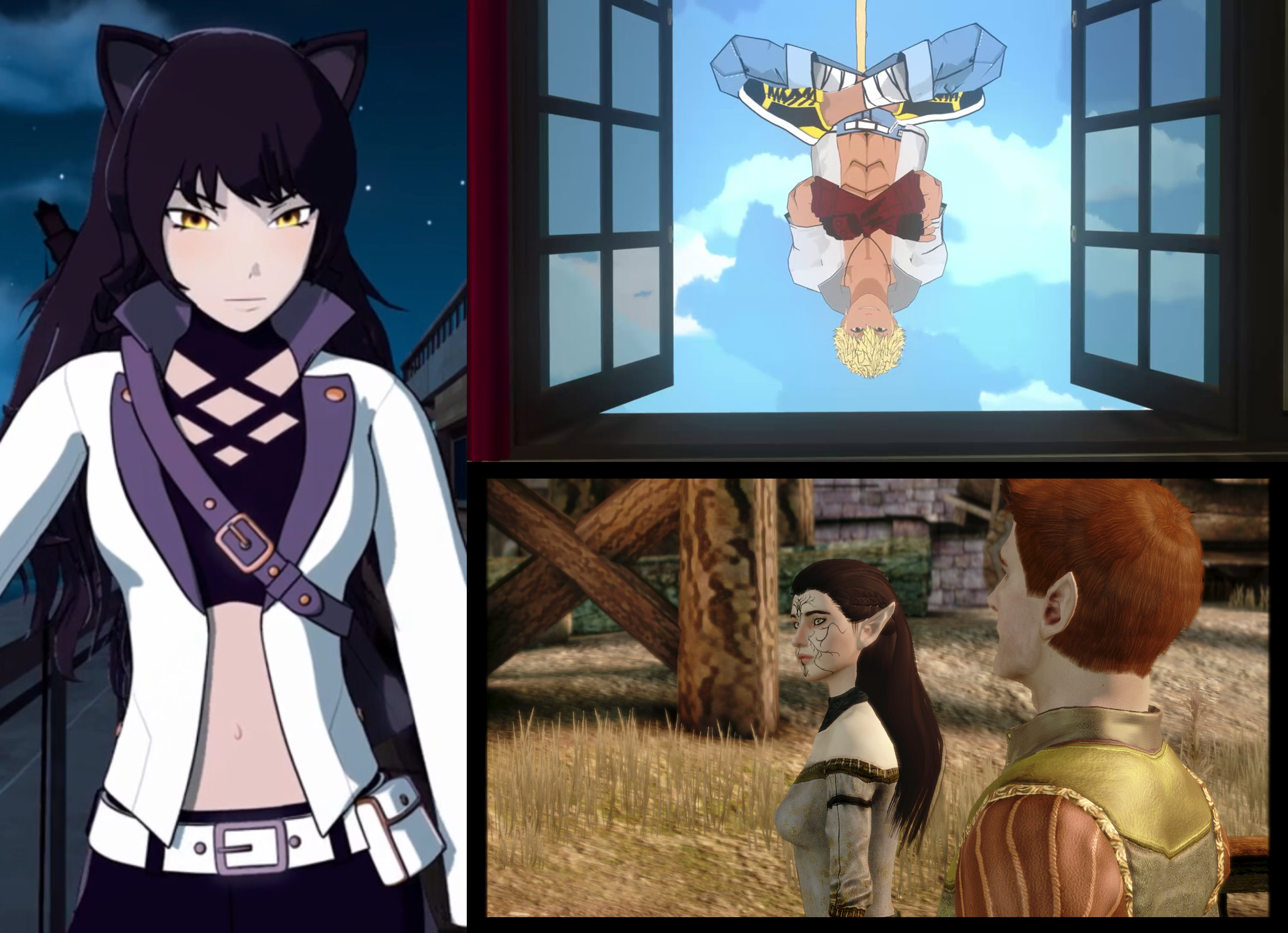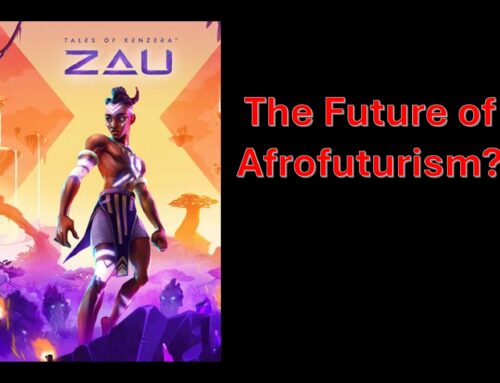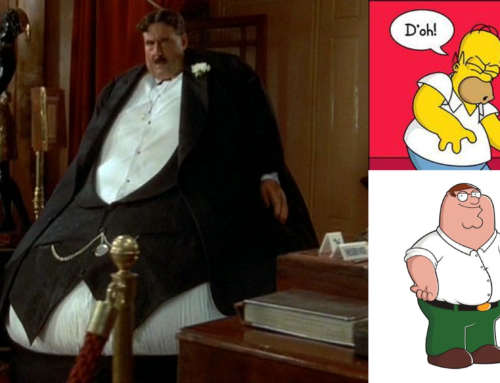In nature, there can never be a truly superior race. This is because, in nature, evolution takes with one hand and gives with the other. There are no improvements, just tradeoffs.
Fantasy doesn’t have to follow this rule. That’s half the point of fantasy: breaking away from the rules of reality. But I’ve noticed a problem with fantastic races in some stories where too many rules are ignored at once, and it’s especially prevalent in stories with fantastic racism.
I’m going to spend most of this article griping about RWBY. This is not the only series that has the problems I’m about to discuss, but it is the best example in recent years.
RWBY is an internet animated series originally conceived by Monty Oum, created for Rooster Teeth. Among the different plot points in the series, there is a racism narrative that exists between humans of Remnant (the world in which RWBY takes place) and the Faunus, a race of human-like people with certain animal parts. These can include a set of cat ears, a prehensile tail, or some other animal-related superpower.
And I need to focus on the “superpower” part, because the Faunus in the show all seem to have some sort of animal-like ability. In some cases, the animal ears give them enhanced hearing. In other cases, their tails can act like an extra limb, or come with a scorpion stinger. And originally, all Faunus had excellent night-vision. This was later retconned due to the creators writing themselves into a corner so that only some Faunus have night-vision, but the result is the same: the Faunus all seem some kind of superhuman abilities, and no apparent drawbacks.
Among the main cast, Blake Belladonna has cat ears, which are at least confirmed to be functional if not superhuman, and she is one of the Faunus with night vision. In real life, having a second set of ears would require her to have a second set of inner ears. This would take up so much space in her skull that whole chunks of her brain would have to be missing, and while that would explain some of her decisions throughout the series, it seems like that has more to do with inconsistent writing than a deliberate plan by the creators to make the character mentally disabled. At the same time, having night vision would require her eyes to contain more rods and fewer cones, which would leave her colorblind.
Another character in the main cast is Sun Wukong, who has a prehensile monkey tail (he’s based on the Monkey King from Journey to the West). The problem with a tail like that is that it requires the human brain to devote more of its limited motor control to this extra appendage, and we only have so much processing power dedicated to the limbs we already have. Humans are uniquely good at being able to throw objects at a target with a high level of accuracy, and that comes from abandoning tails a long time ago in our evolution and directing more of our motor control to our hand-eye coordination. Having a prehensile tail means that Sun shouldn’t be able to actually hit what he’s aiming at with his guns, or be able to dodge incoming projectiles as well as he does in the show. He also has night vision, and therefore should also be colorblind.
Mind you, most of these problems could be resolved by stating that Faunus have less brain power dedicated to thinking and general intelligence. If Blake’s brain actually did have missing parts, or stuff was moved around in her head and her overall thinking power was significantly reduced, it would balance the problems with having an extra pair of ears. If Sun’s tail came at the cost of more of his brain being committed to motor control at the expense of problem solving and cognitive ability, it would explain his situation as well. We’ll be coming back to this.
And yes, I know that as a fantasy cartoon, it doesn’t need to make sense scientifically. Fantasy doesn’t have to follow the rules of reality. But then…if the Faunus have all of these superpowers and none of the real-world disadvantages, why are humans able to oppress them?
In the show, it’s explained that in relatively recent conflicts between humans and the Faunus, the human leadership occasionally forgot that the Faunus have night vision, meaning that the humans weren’t even fully aware of how many advantages the Faunus had, at least among their generals and military commanders. There’s no evidence of humans exploiting their colorblindness by using zebra-pattern camouflage, communicating with messages written on green and red paper, or using colored smoke signals to direct communications that would confuse colorblind Faunus, either.
No, the answer appears to simply be: humans have technology, and the Faunus don’t.
Um, but why though?
At no point in the series are we given any reason to believe that the Faunus are incapable of producing their own technology. There is no reason in-universe to explain why the Faunus are so underdeveloped compared to the sci-fi level tech the humans have at their disposal. Is the problem intelligence? Have I hit the nail on the head when I pointed out that making the Faunus less-intelligent than humans would explain how their bodies handle their animal powers?
…No. Because the series never seems to consider that as a possibility. Actually, I’d go so far as to suggest that the creators of the series would be mortified if you suggested that as a possible explanation, because the Faunus seem to be, at times, more of a creators’ pet than an actual fantastic race of people.
And this is the problem with trying to have your cake and eat it too: you want the Faunus to be a race of special people with special talents, but none of the drawbacks that come with those abilities. You want them to be effectively superior to the humans, but you want humans to be their oppressors. And you want me to suspend my disbelief that the humans were able to dominate these superior beings in the first place.
There is another series I’ve seen handle this issue. Not necessarily a better handling, but…more open-ended, to the point that it might have been made by people aware enough of what they were doing to leave themselves a way out.
In the world of Dragon Age, elves are shown to be heavily oppressed by humans. It doesn’t really matter what era this is taking place. The elves are shown to live much longer than humans, and in a bygone era they were effectively immortal, at least in that they didn’t die of old age.
This would come with the obvious benefit in that skilled warriors who honed their craft would never get too old and creaky to swing their swords, and could keep fighting indefinitely. A species that never dies of old age could also build up a much larger population, and overwhelm their enemies with superior numbers.
The funny thing about Dragon Age, though, is that the creators of these games deliberately leave elements of their own lore unexplained. Not specifically to tease or troll the audience, but simply to capture the feeling that the characters have of not quite knowing everything there is to know. The Elder Scrolls does this as well, to create the sense that these created worlds are actually lived in, since like our world, the historical records we have might not be as accurate as we previously thought, and certain elements don’t always add up.
What this means is that the elves of Dragon Age could have had severe disadvantages that haven’t been brought up in any of the games, but are hidden in the shrouded background lore of the story. This could simply be the writers leaving themselves a backdoor, having not thought up an explanation for elves oppression themselves, but there is also the possibility that this is deliberate.
If you think about it, while an immortal elf warrior might become an excellent warrior over centuries of honing his skills, he might just as easily be too terrified to ever set foot on a battlefield, because being killed in battle is one of the few ways he can actually die. Why not retreat to his home, and avoid fighting altogether so he can live out his eternally youthful lifespan? If all the elves, or even just the majority of fighting-age males adopted this mindset, there wouldn’t be enough of an elven army to fend off invading humans.
Another explanation could have to do with elven leadership. In real life, it is sadly common for old, outdated ideas to only get replaced when the elders of society who hold those ideas age out of power and are themselves replaced by younger people willing to accept newer, improved ways of handling things. For example, germ theory only made its way into medical schools when the people who insisted upon teaching miasma theory finally died of old age and made room for germ theorists. The same logic can be applied to military tactics and strategy as well. What if the reason the elves were dominated by humans was simply because their ancient leaders clung to old ways of doing things that were so outdated, they couldn’t keep up with the newer, more advanced tactics of their human adversaries?
The point I’m making here is that there are a number of ways you can build these fantasy races and make it reasonable for the humans to dominate them. Another option might be to have a race that is objectively superior with no drawbacks, but have them be so arrogant in their supremacy that they’re overtaken by surprise.
Part of me wonders if the problem runs deeper than just making fantasy races with poorly thought out superpowers. I think the real issue is that these authors want to give lip service to the concept of racism, but don’t want to actually investigate what causes people to be racist. It’s like they’re trying to teach an important lesson, but they have no idea what they’re talking about. If they did, I think a lot of them would avoid creating objectively superior races in the first place.





